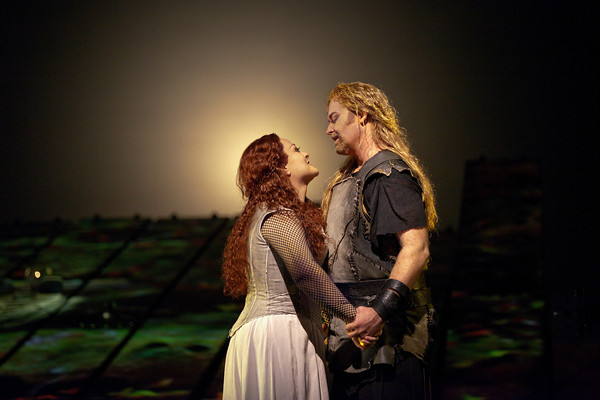Two luminous leads conquer the machine in Met’s “Siegfried”

Jay Hunter Morris and Deborah Voigt in the Metropolitan Opera's new production of Wagner's "Siegfried." Photo: Ken Howard/Metropolitan Opera
As a parenting philosophy, the old maxim that children “should be seen, not heard” has rightfully fallen out of fashion. When it comes to stage sets for opera, though, it wouldn’t hurt to revive it.
“What a haven of peace,” Jay Hunter Morris’s Siegfried sang Thursday night at the Metropolitan Opera as he scaled the fiery mountain in search of Brünnhilde. Around him, the giant rotating planks of Robert Lepage’s set groaned and creaked their way into a new formation, this one resembling an industrial funeral pyre. A few more loud clicks and the gargantuan machine settled down, now animated by video images of brisk flames licking at a forest bed covered with drifting leaves.
With Siegfried the Met launched the third installment of its new Ring cycle, which will come full circle next spring. Since the opening of Das Rheingold a year ago, the set comprising 24 flexible planks fixed to a rotating axis, which Lepage and his set designer, Carl Fillion, also use as a screen for a series of nifty video projections, has lost its novelty. Siegfried offers none of the vertiginous visuals featured in Rheingold, which occasionally managed to convey a sense of myth and magic. In this installment, the monster set has been tamed, programmed to remain static for hours at a time, leaving the singers to scramble around empty surfaces.
With a quality cast, that’s not all bad. For Wagnerites weary of the iconoclastic urges of modern regietheater, Lepage’s Ring, for all its advertised technological genius, is a refuge. A sword is simply a sword – even when Siegfried uses it to disarm the sleeping Brünnhilde. It’s not that Lepage shies away from the work’s sexual and psychological layers: he just doesn’t see any.
That puts the focus on the singing. Morris, replacing Gary Lehman who bowed out due to a viral infection, filled the heroic part with remarkable grace. There is a natural quality to his singing that produces an evenly luminous, unforced, sound. His forest scene in Act II, where Siegfried reflects on the mother he never knew, was lush and dreamy. There was a sense of him singing from inside the music rather than wrestling with it – even when his voice started to fray in the final act. In the first act, there were coordination problems with the orchestra, but that had more to do with the choppy playing in the pit where Fabio Luisi got off to a slow start.
Bryn Terfel, too, as the Wanderer, opened with an uncharacteristically colorless voice and wobbly vibrato. He warmed up noticeably in the second act opposite Eric Owens, who continues his intense portrayal of Alberich with a powerful, if not always pretty, baritone. But Acts I and II rightfully belonged to Gerhard Siegel. As the clever, conniving Mime he giggled and groveled, schemed and threatened, using every tool at his disposal. Among the most impressive is his razor-sharp diction, each consonant spat out like someone expelling sunflower seed husks for rhetorical effect.
His fellow German, bass Hans-Peter König more than filled the role of Fafner with his muscular bass; it was only a shame that for much of his performance he had to do so unseen and amplified from behind a rubbery dragon puppet. With its endearingly goofy grin, there was little chance of it teaching young Siegfried the meaning of fear. At the other end of the anthropomorphic register, Mojca Erdmann was a suitably chirpy Forest Bird, lending her sunny, precise soprano to the video image of a green bird flitting amid the birch trees.
No special effects were offered to visualize the transformation of Brünnhilde from formerly feisty warrior-goddess to incandescent lover, but then, Deborah Voigt didn’t need any. As it was, her performance felt more like a solo flight, her voluptuous high notes soaring over the orchestra, which by then had finally hit its stride. There is a marked disparity between her joyfully radiant upper register and the more burnished sound she produces lower down, but both are tied together by a generosity of spirit uniquely her own. Once freed of her breastplate, she looked lovely with her flowing red curls and simple white gown. A dishy Brünnhilde opposite a strapping, blond-stubbled Siegfried? A more imaginative director might have sparked real chemistry between them.
Siegfried will be repeated 6 p.m. Nov. 1 and 12 p.m. Nov. 5, returning as part of the complete Ring cycle with some cast changes April 21 through May 9. For tickets and cast details go to metopera.org or call 212-362-6000.
Posted Oct 28, 2011 at 10:05 pm by Bob Huyes
Choppy playing in the pit? The orchestra played wonderfully and Luisi was THE star of the evening!
Posted Nov 18, 2011 at 1:37 pm by ph
“her voluptuous high notes soaring over the orchestra”
Are you tone deaf? Maybe you should better distinguish between her beautiful appearance/acting and her disappointing singing.